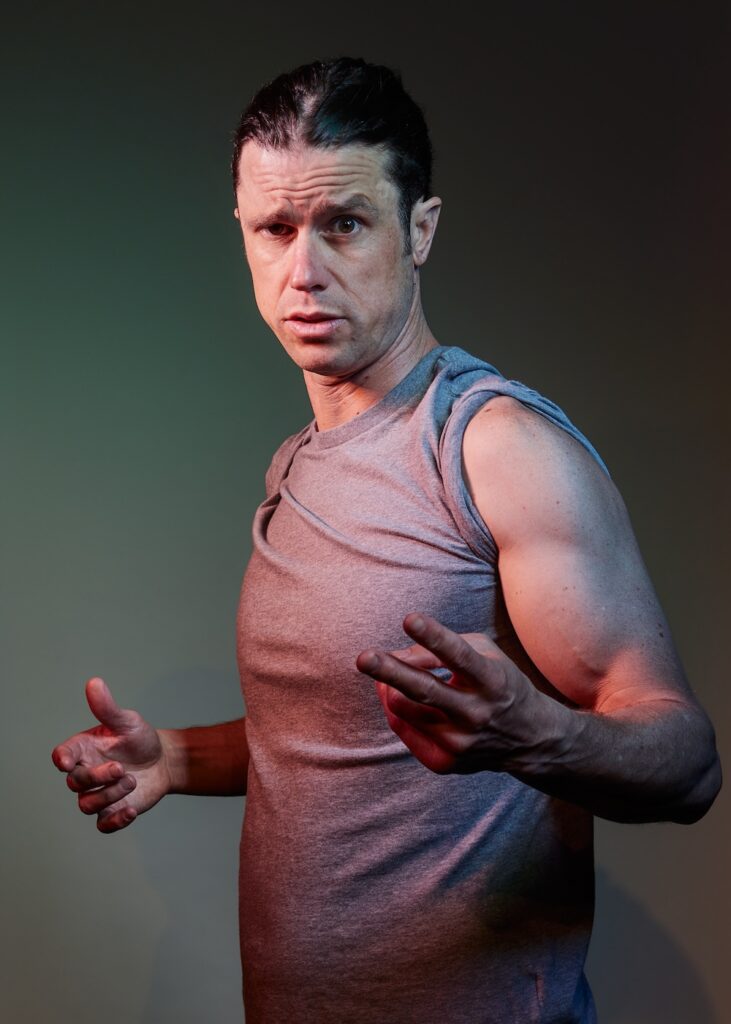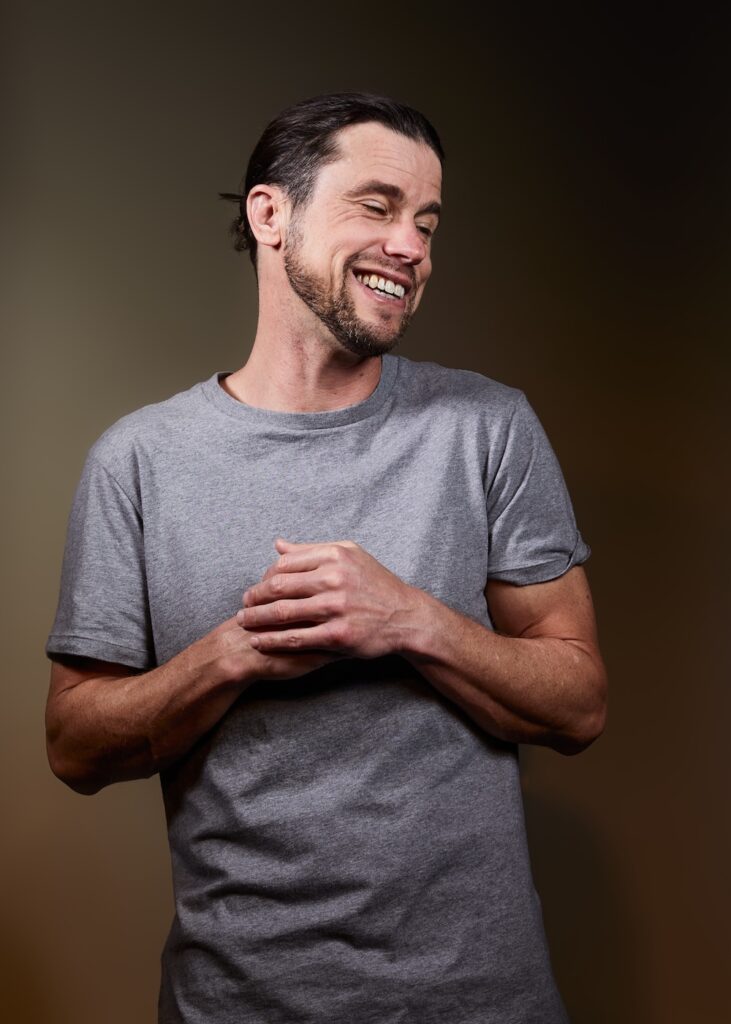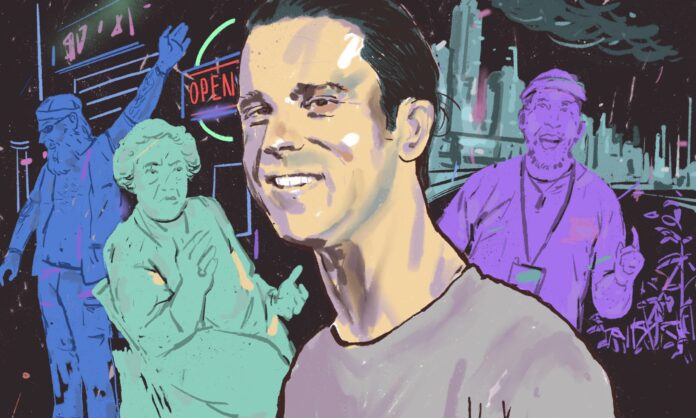Listening to the January 6 hearings, particularly the parts about the election workers who were bullied, drove home something for writer and performer Dan Hoyle: We, as a society, can’t agree on basic facts.
Hoyle’s productions, like Tings Dey Happen, Border People, and The Real Americans, are created through a painstaking, far-ranging interview process he calls “journalistic theater.” He employed that methodology for a new show, Takes All Kinds, which runs October 4-26 at San Francisco’s The Marsh. It focuses on democracy and how people change, speaking with real-life characters rooted throughout the US political ecosystem.
But this is not the idea, nor geographic location, he started out with. He originally contemplated making a show about reconciliation, only to have that concept take him through multiple false starts. He planned to travel to South Africa to do research and talk to people whose words he thought that he would eventually use in the show.
“I actually set up quite a few meetings,” Hoyle said. “But the more I talked to people there, they said, ‘You know, the Truth and Reconciliation Commission is almost 30 years old. South Africa struggling with corruption and economic tailspin, and infrastructural collapse.”

Then someone suggested that he instead focus on Colombia, which is still emerging from a 50-year civil conflict. Hoyle went there for a couple weeks and spoke with former members of the country’s Revolutionary Armed Forces, foot soldiers, activists, and everyday people. It was a fascinating trip—but he realized his assessment of its cultural moment was way off, and he would have to turn elsewhere.
Right before his Colombia trip he had gone to Las Vegas—close, relatively cheap, and full of people from all over the country—to get back into research mode. “Pretty much everyone there, when I would bring up the concept of reconciliation, would be like, ‘What? Oh, no. There’s no reconciliation. We’re still fighting,’” he told 48hills. “I thought, Oh, right. I sort of got too theoretical. They’re not at the end of some civil conflict. They’re trying to avoid one.”
He realized the obvious choice to document the cultural fracture was right in front of his nose: the deeply divided US of A. He headed out to Sarasota, Florida, where conservative parent watchdog Moms for Liberty—famed for its anti-queer, anti-critical race theory book ban crusades—first started.
The far right had recently snagged three seats on the school board, and Hoyle found 400 people amassed outside a board meeting. In interviewing some of them, he found the complexities and contradictions that fascinated him. Take, for example, the case of the former evangelical Christian Phish-head who had moved to Sarasota because he could get drugs more easily in a college town. The guy ended up getting his master’s in computer engineering and was running the town’s Reddit.
“He had this whole awakening, and his daughter came out as being gay, so he got off the sidelines,” Hoyle said. “At this meeting, he had his dip in his lip and was spitting in his cup. So that was really interesting, these unlikely activists and change-makers.”
After Sarasota, Hoyle headed to Savannah, Georgia to see a woman he’d been put in touch back when he’d been looking to make a show about reconciliation.
“She’s a sweet Southern white lady, 72 years old, and she said, ‘You know, I thought my retirement was going to be drinking white wine and playing bridge, but then I took a DNA test that said I was .1 percent African American,’” Hoyle said. “She started researching and she finds that her great-grandfather was this big slave trader.”
Hoyle learned that much of Charleston’s wealth came from trading enslaved people. The woman started looking into the history of the town, much of it buried.
“She starts going public with it,” he said. “And she says, and I grew up with these people, so nobody can say I’m some person coming in to stir up the pot, like you.”

He was tickled.
“The thing I love about it is, at a time when democracy does feel threatened in our country, there’s a lot of different spaces where democracy happens,” he said. “Kind of small “d” democracy, at school board meetings and this woman in her community.”
Takes All Kinds wound up incorporating the voice of unlikely characters from across the United States. “There’s a barber shop in Las Vegas that I had read about because they talk about politics,” said Hoyle. “It’s basically all these Latino guys, and I go in there, and they’re mostly Trump supporters. At first, they’re kind of like, ‘Oh, you want to talk politics. You want to get haircut? Yeah, you’re one of those dudes who hasn’t had a haircut in, like, three years, right? Oh, your wife cuts your hair? Oh, man, that’s code red. Get the chair, get in the chair. So, I hang out with them for a couple days, and it’s really fascinating to hear how these mostly young guys, how they see it.”
Why would all these people share their stories with a stranger? That’s something he’s been thinking about for 20 years, Hoyle says. A question he asks after shows and the response, gives him an idea as to why.
“I do a talk-back, and I say, ‘Raise your hand if you feel like you’re understood or seen by people in the world.’ And pretty much no one raises their hand. And when I teach my students, I say, ‘You’re offering people an opportunity, a gift, to be heard and seen at a deep level, at length, exactly as they want to be right now. Not by their family and friends who have baggage of a long time, but right now.’”
TAKES ALL KINDS runs through October 26. The Marsh, SF. Tickets and more info here.







